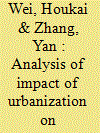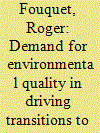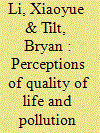|
|
|
Sort Order |
|
|
|
Items / Page
|
|
|
|
|
|
|
| Srl | Item |
| 1 |
ID:
152520


|
|
|
|
|
| Summary/Abstract |
As a developing country with great regional disparities, China's rapid urbanization has had important impacts on environmental quality. In this study, the drivers-mechanisms-effects (DME) model is built, which shows how element agglomeration, scale growth, knowledge accumulation and industry evolution drive the environmental system to change during the urbanization process. An econometric regression model using provincial panel data is further constructed to empirically analyze the impacts of urbanization on environmental quality. It is shown that during the process of urbanization in China, element agglomeration and knowledge accumulation help to improve environmental quality but with weak positive effect, while growing urban scale and industrial structure have obvious negative effects on environmental quality. The “inverted-U shape” (up first and then down) change in the environmental quality during China's urbanization process is obvious. It is critical that China concentrates on the transformations of both city development paths and urbanization models to reduce resource and environmental costs as much as possible.
|
|
|
|
|
|
|
|
|
|
|
|
|
|
|
|
| 2 |
ID:
141260


|
|
|
|
|
| Summary/Abstract |
The social, economic, and environmental costs of feeding a burgeoning and increasingly affluent human population will depend, in part, on how we increase crop production on under-yielding agricultural landscapes, and by how much. Such areas have a “yield gap” between the crop yields they achieve and the crop yields that could be achieved under more intensive management. Crop yield gaps have received increased attention in recent years due to concerns over land scarcity, stagnating crop yield trends in some important agricultural areas, and large projected increases in food demand. Recent analyses of global data sets and results from field trials have improved our understanding of where yield gaps exist and their potential contribution to increasing the food supply. Achieving yield gap closure is a complex task: while agronomic approaches to closing yield gaps are generally well-known, a variety of social, political, and economic factors allow them to persist. The degree to which closing yield gaps will lead to greater food security and environmental benefits remains unclear, and will be strongly influenced by the particular strategies adopted.
|
|
|
|
|
|
|
|
|
|
|
|
|
|
|
|
| 3 |
ID:
116701


|
|
|
|
|
| Publication |
2012.
|
| Summary/Abstract |
The purpose of this paper is to understand the long run demand for energy-related environmental quality, its influence on legislation and on transitions to low polluting energy sources. It presents a series of episodes in British history where a demand for improvements in energy-related environmental quality existed. These episodes helped to identify a few cases where markets partially drove transitions to low polluting energy sources, in specific economic conditions. More generally, they showed that, when pushed, governments will introduce environmental legislation, although it tends to be weak and poorly enforced. In the case of air pollution, strong and binding legislation occurred roughly one hundred years later than was socially optimal. Based on this evidence, for a transition to a low carbon economy, governments will probably need to introduce focussed and binding legislation, and this cannot be expected without strong and sustained demand for climate stability. This demand will need to be spearheaded by pressure groups to introduce legislation, to enforce it and to avoid it being over-turned by future governments.
|
|
|
|
|
|
|
|
|
|
|
|
|
|
|
|
| 4 |
ID:
081898


|
|
|
|
|
| Publication |
2008.
|
| Summary/Abstract |
Using provincial data, the present paper examines the impact of cultivated land conversion on agriculture and the environment. It is found that the grain production center is gradually moving towards more fragile and water scarce areas, putting more pressure on the environment. Land conversion caused large losses in ecosystem service values in the 1990s, but large scale ecological restoration programs have been implemented since 2000 to compensate for such losses. The ecological restoration programs are concentrated in regions with relatively low land productivity, whereas cultivated land conversion usually takes place in areas with relatively high land productivity. Newly-cultivated land, especially that in areas marginally suit for agricultural production, is likely to have much lower productivity levels than the original cultivated land. Because the stock of potentially cultivable land is almost exhausted, China's grain self-sufficiency policy can only be maintained by preserving the available stock of arable land and increasing its productivity in a sustainable way
|
|
|
|
|
|
|
|
|
|
|
|
|
|
|
|
| 5 |
ID:
159837


|
|
|
|
|
| Summary/Abstract |
After decades of rapid economic development, China is facing severe environmental problems. In particular, smog in urban areas has recently attracted a great deal of scientific and media attention both domestically and internationally. Our focus in this article is on public perceptions of smog in the northern city of Tangshan, which is routinely ranked as one of the urban areas with the worst air quality in the nation. In this article, we present the results of qualitative interviews and quantitative surveys with 341 urban residents. We examine how these residents perceive and weigh the importance of various aspects related to quality of life, including their experience with air pollution. Study participants considered environmental quality an issue of lower priority than many others; however, they surprisingly ranked it over economic concerns such as jobs and income. Their responses suggest that, for many urban residents, environmental problems like smog are fundamentally linked to basic quality of life concerns such as physical health and family well-being. We interpret our findings in the context of literature on the rise of China's middle class, the rise of environmental consciousness, and the role of gender in mediating perceptions of pollution and family health. We also consider the implications of these findings for the control and remediation of air pollution in China today.
|
|
|
|
|
|
|
|
|
|
|
|
|
|
|
|
|
|
|
|
|